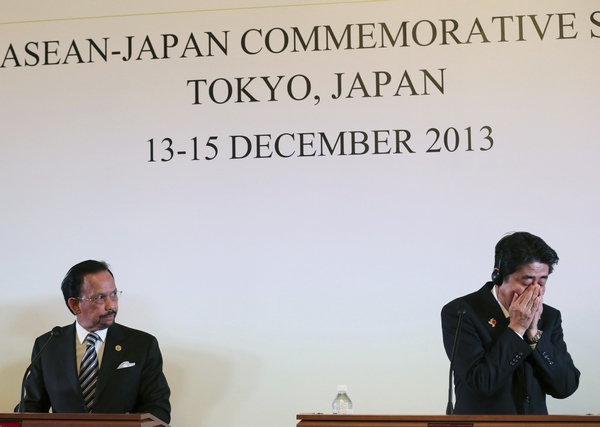 |
|
Japanese Prime Minister Shinzo Abe (right) sneezes as Brunei's Sultan Hassanal Bolkiah, chairman of the ASEAN-Japan summit, looks on during a joint news announcement at the Akasaka State guesthouse in Tokyo on Saturday. Koji Sasahara / AFP |
ASEAN-Japan summit addresses 'freedom of overflight', connectivity
While the statement issued by the joint ASEAN-Japan summit on Saturday did not specifically mention any country, the phrase "freedom of overflight" is understood as an implicit reference to China's recently established air defense identification zone.The statement said the ASEAN and Japan have agreed to strengthen cooperation regarding air and maritime linkages, and to recognize the benefits of enhanced connectivity among the countries.
The countries will "enhance cooperation in ensuring the freedom of overflight and civil aviation safety in accordance with the universally recognized principles of international law", it said.
At the summit and on its sidelines, Japanese Prime Minister Shinzo Abe sought to generate an understanding of Japan's position on China's ADIZ among the ASEAN countries.
But not all leaders shared his view.
Brunei's Sultan Hassanal Bolkiah said on Friday - the opening day of the summit, which ends on Sunday - that the issue should be resolved through consultations between Japan and China.
Lu Yaodong, director of the Japanese diplomacy department of the Institute of Japan Studies under the Chinese Academy of Social Sciences, said China's Southeast Asian neighbors - most of which have strong relationships with China - hope conflicts between China and Japan will be resolved.
"The growing antagonism between Tokyo and Beijing actually doesn't serve their interests," Lu said.
"They have their own opinions on relevant issues."
Japanese diplomats had been negotiating with their ASEAN counterparts to include a sharp reference to China's ADIZ in the joint statement.
Abe succeeded in getting his proposed language about a "proactive contribution to peace" incorporated into the statement.
Japan has been playing up what it calls Beijing's intention to establish an ADIZ in the South China Sea.
Japan and Malaysia agreed to enhance maritime security cooperation. The two countries staged the first-ever joint exercise between their maritime security organizations in September.
Japan will contribute $100 million to the Japan-ASEAN integration fund. The move is intended to boost the countries' coast guards' capacity-building and enhance the links between the region's maritime and continental nations, Japan's foreign ministry said.
Jiang Ruiping, an expert on the Japanese economy and China Foreign Affairs University's vice-president, said the Japanese cabinet is enhancing economic relations with the ASEAN partly out of fear of China's growing influence in the region.
"All of East Asia is undergoing rapid development," Jiang said.
"Tokyo believes China is gradually replacing the influence of Japan and even the United States in the region."
Japan is attempting to gain more bargaining chips for the looming standoff over China's Diaoyu Islands. It is highlighting shared strategic interest with parties involved in the South China Sea issue, including the Philippines, to form an alliance based on "protecting the order on the high seas" to contain China, Jiang added.
Since assuming office 11 months ago, Abe has visited all 10 ASEAN countries - Brunei, Cambodia, Indonesia, Laos, Malaysia, Myanmar, the Philippines, Singapore, Thailand and Vietnam.
Japan's government hopes to demonstrate its commitment to the fast-growing, resource-rich region. Diplomatic ties with Southeast Asia have been a major theme of Japanese policy because the region is "Japan's traditional market", Lu said.
Although Japan's hawkish prime minister has taken a year to deepen his country's relations with the ASEAN, "(Japan's) diplomatic deadlock with China and South Korea is far from over", Lu said.
|
|
|
|
|
|
|
|
